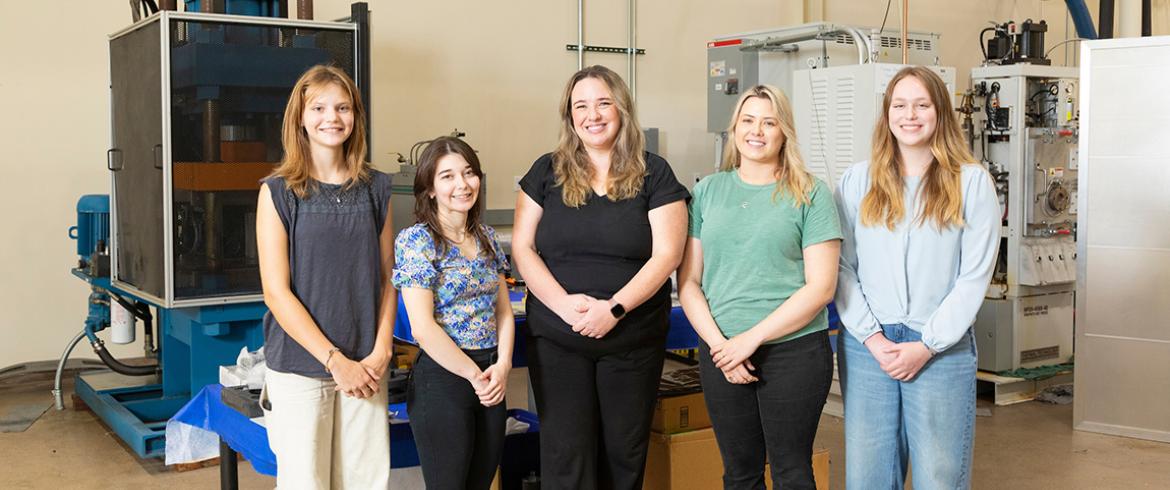
(L-R): Trinity Francis, Ana De Leon, Prof. Rebekah Sweat, Aspen Reyes, and Alyssa Bauer at the High-Performance Materials Institute in the Materials Research Building of the FAMU-FSU College of Engineering in Tallahassee, Florida on July 31, 2024. Over the course of summer 2024, this team of two doctoral candidates (De Leon and Reyes) and two high school interns (Francis and Bauer) worked on complex materials research in Sweat’s lab. (Scott Holstein/FAMU-FSU College of Engineering)
A transformation has been happening in the scientific community as more female graduate students are playing a pivotal role in the traditionally male-dominated fields of science, technology, engineering and mathematics (STEM) fields.
Nowhere is this better illustrated than in Rebekah Sweat’s lab at the FAMU-FSU College of Engineering.
Sweat, an assistant professor in the Department of Industrial and Manufacturing Engineering at the joint college, works with two female graduate students in her lab who are up-and-coming rock stars in engineering research. They work in Sweat’s lab at Florida State University’s High-Performance Materials Institute (HPMI).
“Two of our female IME students produced first-author research publications in just the last month,” Sweat said. “In addition, we have two female rising high school seniors who collaborated on the work and are acknowledged in the papers for their contribution to the research. This is quite remarkable.”
Her admiration for these women isn't just about their academic achievements; it’s about changing narratives.
“We have more female students than we have ever had before, which is a revelation,” Sweat explained. “Walking into an engineering lab doesn’t mean seeing a male-dominated environment. Here, we have a vibrant mix, sometimes even predominantly female. This dynamic shows that engineering is for everyone, irrespective of gender.”
Sweat’s research group is at the forefront of working with extreme environment material science. “We’re pushing the boundaries of what’s possible, whether that’s with materials that withstand the abyssal pressures under the sea or those that endure the searing heat of space travel,” she explained.
Mentoring the Next Generation of Female Engineers
Ana De Leon and Aspen Reyes are two doctoral students in Sweat’s group who have published two papers in their areas of expertise. De Leon’s work focused on bonding fibers, both micro and nano-scale and resins under various conditions, including humidity and extreme temperatures. Reyes’ work involved carbon fiber and nanocomposites intended for high-temperature applications in supersonic, space and harsh environments.
“The mentorship Dr. Sweat has provided is transformative,” Reyes said. “She is close to our age and we’ve watched her go through her early career building a lab. Now, Ana and I are graduating in the near future and hoping to build our labs, and we are also passing our knowledge on to our high schoolers. It’s come full circle for me.”

Seeding the Field in High School
Alyssa Bauer and Trinity Francis are the secondary school members of the research team, participating and summer interns in the Sweat lab.
They point to the opportunity to see women making strides in science—but also investing in them as next-generation researchers, as important aspects of the experience.
“Getting hands-on and lab experience has been great,” Bauer said. “I have been working with carbon fibers and composites and have helped with some of the research papers, Ana and Aspen have been working on.”
Sweat values mentorship and representation in her student’s experiences. Bauer reflected on the team dynamics, saying, “Ana, Aspen, and Dr. Sweat don’t just lead; they listen. They are eager to dive into problems no matter who’s project it is and won’t stop until they figure it out.”
“Researching has been an interesting experience, mixing lots of stuff together, pouring different components together, and creating something new in the end,” Francis added. “I like to see what people who are engineering majors do.”
In a world where female engineers continue to break barriers and lead with distinction, Sweat and her team at HPMI are not just contributing to the engineering field; they’re reshaping it, ensuring it’s a place where every aspiring engineer can see themselves reflected in its future.
Read the DeLeon and Reyes research papers:
- Hygrothermal effect and statistical analysis of the interfacial performance of nano and microscale polymer composites: Composite Interfaces: Vol 0, No 0 (tandfonline.com)
- Supersonic hot jet ablative testing and analysis of boron nitride nanotube hybrid composites - ScienceDirect
RELATED ARTICLES
From Aerial Acts to Shattering Composites, Engineering Graduate Student is Here for It
FAMU Engineering Grad Student Receives Zonta International Fellowship
